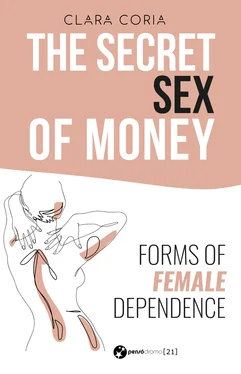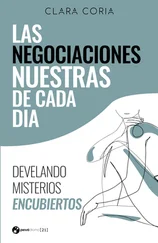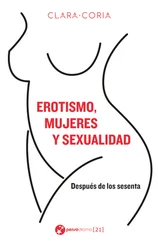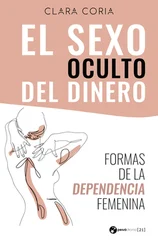
THE SECRET SEX
OF
MONEY
Forms of female dependence
ANDROGYNOUS 21

© Clara Coria
First published in Argentina in 1986
Original title:
El sexo oculto del dinero -
Formas de la dependencia femenina
First published in English with the title:
The secret sex of money -
Forms of female dependence
© Pensódromo S.L., 2021
English translation copyright © Mark Lodge
Editor: Henry Odell - henry@pensodromo.com
Cover design: Cristina Martínez Balmaceda - Pensódromo
ISBN: 978-84-124690-0-4
This book is sold subject to the condition that it shall not, by way of trade or otherwise, be lent, re-sold, hired out or otherwise circulated without the publisher’s prior consent in any form of binding or cover other than that in which it is published and without a similar condition including this condition being impose on the subsequent purchaser.
Work published under the “Sur” Support Program to Translations of the Ministry of Foreign Affairs, International Trade and Worship of the Argentine Republic.
Obra editada en el marco del Programa “Sur” de Apoyo a las Traducciones del Ministerio de Relaciones Exteriores, Comercio Internacional y Culto de la República Argentina.
Cover
Title Page THE SECRET SEX OF MONEY Forms of female dependence ANDROGYNOUS 21
Credits Credits © Clara Coria First published in Argentina in 1986 Original title: El sexo oculto del dinero - Formas de la dependencia femenina First published in English with the title: The secret sex of money - Forms of female dependence © Pensódromo S.L., 2021 English translation copyright © Mark Lodge Editor: Henry Odell - henry@pensodromo.com Cover design: Cristina Martínez Balmaceda - Pensódromo ISBN: 978-84-124690-0-4 This book is sold subject to the condition that it shall not, by way of trade or otherwise, be lent, re-sold, hired out or otherwise circulated without the publisher’s prior consent in any form of binding or cover other than that in which it is published and without a similar condition including this condition being impose on the subsequent purchaser. Work published under the “Sur” Support Program to Translations of the Ministry of Foreign Affairs, International Trade and Worship of the Argentine Republic. Obra editada en el marco del Programa “Sur” de Apoyo a las Traducciones del Ministerio de Relaciones Exteriores, Comercio Internacional y Culto de la República Argentina.
Editor’s prologue Editor’s prologue Thirty-five years have passed, indeed, and during this time, the evolution of society seems to have become increasingly bent on “money” as the leitmotiv for our existences and, along with it – despite the efforts in changing attitudes – its control over the relationships between people, both in the “public” and “private” realms, has been reinforced. What leads a publisher to publish a book thirty-five years years after the date of its first publication, with approximately ten editions and reprints (in Spanish) since then, and to publish it in English for the first time? We have decided to publish this book by Clara Coria because we believe that the main thrusts of her analysis are still amazingly pertinent. Her premises on the subject are still indispensable for all who are willing to rethink and critically analyze the role they play in the context of their family and society as a whole. The dawn of the 21st century brought with it the loss of certainties, the decline of the great collective projects with the crisis of previous utopias (both for Left and the Right) and the birth of new ways of seeing the world. A focus geared towards the personal level, social and economic success, dominates current society, which is immersed in a deep crisis. In answer to this, different voices, from men and women, rise up to speak about the need to reclaim the essential values of the human being. Our prevailing culture has allowed for the emergence of a new model of man and woman that implies a break with the traditional model. The book by Clara Coria we present to you is, precisely, one of the parts contributing to the emergence of this new model. These contents need to be read with an open mind, a sincere and self-critical attitude and a willingness to take up the difficult task of questioning oneself and shaking deep-rooted certainties in our way of life. We are publishing this book as a part of a corpus we have decided to call Androgynous 21, a system of related published materials from which to promote the voices of men and women who advocate a greater balance between the feminine and the masculine in modern society. We hope that both this book and its proposal interest you. Henry Odell
As a prologue
25 years later
Introduction
Origins
Referential framework
The contents
Some important clarifications
Bibliographic References
I. Women’s economic dependence
Economic dependence:
The phantasm of prostitution
Money and sex: a fundamental transgression (modesty, shame and guilt)
Bibliographic References
II. The benefits of economic dependence in women
The primary gain: anxiety versus freedom experienced as transgression
The secondary gains of economic dependence
Protection: a seductive siren’s call…
A suggestive triad: “small” money, restricted space and indiscriminate time
Bibliographic References
III. Love and money: maternal altruism versus manly speculation?
A female paradigm: the maternal ideal
“Mr Money is a mighty gentleman”
Professional fees or the money “that is charged”. A difficult dilemma to solve: bad mother or public woman?
Bibliographic References
IV. Money in a marital partnership
A partnership in which some people are more equal than others
“Big” money and “small” money
Money for dependence
Bibliographic References
V. A particular distribution of power: The kids are mine and the money is yours
The “queen” of the home
Are children, as instruments of power, equal to money?
The myth of the “hidden power”
Bibliographic References
VI. Men and the accumulation of money
Money, an indicator of masculinity?
“Time is money”… a white lie?
Bibliographic References
VII. Some considerations on money and its meaning in the context of psychological treatments
Do therapists have the same attitude towards the economic dependence of their male patients as they do towards their female patients?
Female (economic) dependence in psychotherapeutic treatments of women
Suggestions for a possible alternative for tackling women’s economic dependence
Bibliographic References
Further reading
About the author
Notes
Thirty-five years have passed, indeed, and during this time, the evolution of society seems to have become increasingly bent on “money” as the leitmotiv for our existences and, along with it – despite the efforts in changing attitudes – its control over the relationships between people, both in the “public” and “private” realms, has been reinforced.
What leads a publisher to publish a book thirty-five years years after the date of its first publication, with approximately ten editions and reprints (in Spanish) since then, and to publish it in English for the first time?
Читать дальше














